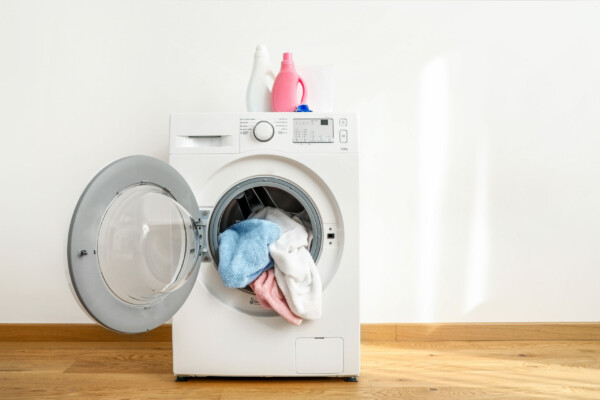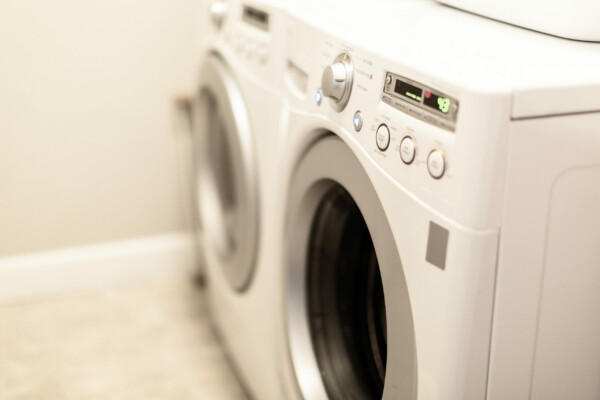Why is My Dryer Leaking Water and How to Fix It
Discovering water in dryer or underneath it can be quite vexing. But can a dryer leak water? Unfortunately, this is not uncommon and can be caused by various reasons. This guide will teach you how to fix tumble dryer leaking water. But please remember that before embarking on any repair endeavors, it’s imperative to prioritize safety by unplugging the dryer and disconnecting it from its power source.
Clogged Vent Line
A key factor leading to a dryer vent dripping water is a blocked or obstructed vent line. Throughout the drying process, heated, humid air is released through the ventilation. However, if the line is hindered or twisted, the moisture may condense, resulting in liquid emerging from the device.
Look at these signs that indicate the problem:
- Clothes take longer to dry
- The device becomes excessively hot during the cycle
- Lint accumulates around the vent opening
- You can see the dryer leaking water from door or other areas
Here is how you tackle this issue:
- Detach the vent line from both the dryer and the exterior vent aperture.
- Use a brush or a vacuum cleaner attachment to eliminate any lint and debris from within the line.
- Inspect for any twists, compressed segments, or blockages in the line, and fix them if necessary.
- Verify that the vent line is as brief and direct as feasible, with minimal curves or angles.
Once this is done, you can reattach the line to both the dryer and the exterior vent opening, ensuring a secure seal.
Faulty Water Seals
How to fix tumble dryer leaking water? Typically, dryers have seals or gaskets to keep water in the drum. But as time passes, these seals may deteriorate, develop cracks, or dislodge, letting water seep from the device door or other parts.
Here are the main indicators of this problem:
- Water underneath dryer or on the floor around the device
- Visible cracks or damage to the seals
- Mold or mildew growth around the seals
Here is how to fix faulty water seals:
- Find the water seals or gaskets around the drum and door zones.
- Examine the seals for any cracks, rips, or deterioration signs.
- Ones with any kind of damage must be replaced.
- Thoroughly cleanse the areas around the seals’ installation points to ensure the best fit possible.
Adhere to the manufacturer’s guidelines when installing the new seals, ensuring a snug and steadfast placement.
Drain-related Issues
Some dryers, particularly those equipped with a condensation drying mechanism, feature a drain to get rid of excessive water in dryer. Blocking this drain may result in water leakage from the dryer.
Keep an eye on these signs to recognize the problem:
- Water under dryer or in the drain pan
- Slow or incomplete draining of water
- Musty odors coming from the dryer
You can fix it using the following method:
- Find the drain line or drain pan at the base of the device.
- Inspect for any apparent blockages or impediments within the drain line and get rid of them with a drain snake or compressed air.
- Thoroughly cleanse the drain pan, ensuring it is devoid of any debris.
If the issue persists, consider replacing the drain pump or other components associated with the drainage system.
Condensation Problems
At times, an excess of condensation accumulates within the dryer drum or its components, resulting in water leakage. In nine out of ten cases, the reason for this is either high humidity levels, inadequate ventilation in the room, or a defective heating element.
Here are the most common signs of this problem you need to watch out for:
- Excessive moisture or dampness inside the dryer drum
- Water coming out of dryer during or after the cycle
- Rust or corrosion on the device components
You can fix it by following these actions:
- Maintain adequate airflow within the laundry space where the dryer is located.
- Install a dehumidifier or air conditioner to help lower humidity levels.
- Check whether the dryer’s heating element is working correctly and replace it if necessary.
- Clean the moisture sensor and thermostat within the dryer to reduce the possibility of mistakenly appearing error codes.
Consider installing a purpose-specific drain kit or adjusting the dryer’s ventilation to enhance airflow and abstraction of moisture.
Preventive Maintenance
Regular maintenance is vital to minimize the risk of your dryer leaking water from door and prolong its lifespan. Here is what you need to remember to do:
- Before each cycle, make sure to clean the lint trap to maintain optimal airflow.
- Every year, inspect and clean the vent line to get rid of dirt deposits and clogging.
- Examine and replace water seals and gaskets as they wear off.
- Ensure the dryer is placed on a level surface and remains well-balanced to minimize vibration and load upon its components.
The manufacturer’s manual provides essential guidance on the proper operation and upkeep of your particular dryer model.
Conclusion
The answer to the question, ‘Can a dryer leak water?’ is yes. If the recommended measures fail to resolve the issue of water leakage from your dryer, seek assistance from a reputable appliance repair service, They will provide you with a custom-tailored solution based on thorough diagnostics.
Addressing the problem promptly is critical to avert additional water damage, mold, and potential electrical hazards. By grasping the typical warning signs, you can prolong your device’s service life.
Date of page creation: March 06, 2024
Page update date: March 20, 2024
Ask a Question



